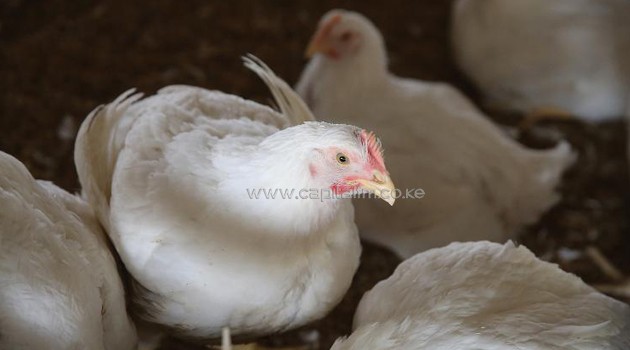Public health authorities on Sunday banned the transport of poultry nationwide after the discovery in Hekendorp village of a “highly pathogenic” form of avian influenza that is very dangerous to birds and can contaminate humans.
The destruction of around 150,000 chickens at the farm in Hekendorp, near Utrecht, should be completed on Monday, said Lex Denden of the Dutch Food and Consumer Product Safety Authority (NVWA).
“We’re checking another 16 poultry farms in around a 10-kilometre (six mile) radius,” he told AFP.
“No other cases have so far been detected and we hope to complete the tests today.”
Dutch media reported that the birds would be gassed and that two farms in the immediate vicinity of the infected farm had already been given the all clear.
Heavy vehicles are seen parked outside the poultry farm in the village of Hekendorp, where a a strain of bird flu was identified, on November 16, 2014
The atmosphere in the village was quiet on Monday, with police and black barriers screening off the infected farm.
Officials have identified the flu as being the H5N8 strain, previously detected only in Asia, but which was identified on a German farm in November.
Several hundred thousand birds, mainly ducks, have been culled over the last two months because of a South Korean outbreak.
Avian influenza is fatal for chickens, and poses a health threat to humans, who can fall sick after handling infected poultry.
But Dutch authorities have said human infection can only occur following “intense and direct contact” with infected birds.
Renowned virologist and bird flu expert Ron Fouchier of Erasmus Medical Center in Rotterdam told AFP it was a mystery how the virus had reached the Netherlands.
“We have no idea where it’s coming from,” he said, noting that the flu had “popped up, out of nowhere, in farms without any poultry trade record with Asia.”
© AFP
Around 150,000 chickens were to be culled at this farm in Hekendorp, the Netherlands, after a strain of bird flu was identified
Fouchier said that infection likely came through wild waterbirds, such as ducks, geese or swans, that had migrated from Asia and left droppings near the Dutch farm.
“Fortunately, they aren’t many species that do that, so we are working with ornithologists to determine which birds it could be, what population size it has,” he said.
Fouchier said that precautionary measures needed to be taken but that he didn’t expect other farms or humans to become infected as outdoor poultry farms had been relocated indoors.
“We can’t really talk about a major return of the virus since it’s a different strain than in 2005-06,” he said.
The H5N1 strain of bird flu has killed more than 400 people, mainly in Southeast Asia, since first appearing in 2003. Another strain of bird flu, H7N9, has claimed more than 170 lives since emerging in 2013.
The Dutch transport ban is to last a maximum of 72 hours from Sunday and includes moving poultry, eggs and bird manure.
However, in a 10-kilometre ring around the affected farm the ban could last up to 30 days.
Hunting has also been banned for now across the country.
Hekendorp resident Aad van de Sande told AFP that the village remained calm in spite of the media attention.
“Some residents are worried, but we won’t panic, because that’s not what we do,” said the white-bearded pensioner as he cycled through the village.
According to Dutch media, the H7N7 strain of avian flu severely hit the Netherlands in 2003 with health authorities destroying some 30 million birds in an effort to quash an outbreak.
British authorities on Sunday reported a bird flu outbreak at a duck breeding farm in northern England but said that the risk to public health was “very low”. They did not specify which exact strain was detected at the farm in Yorkshire.










































